| Listing 1 - 10 of 10 |
Sort by
|
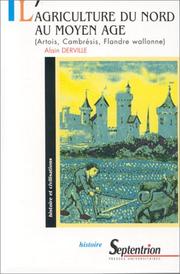
ISBN: 2757434616 2859395849 Year: 2021 Publisher: Villeneuve d'Ascq : Presses universitaires du Septentrion,
Abstract | Keywords | Export | Availability | Bookmark
 Loading...
Loading...Choose an application
- Reference Manager
- EndNote
- RefWorks (Direct export to RefWorks)
En général l’agriculture stagna dans la médiocrité jusque vers 1850. Dans le Nord au contraire le Moyen Age vit naître l’agriculture flamande. Ce fut une polyculture aux assolements complexes faisant une place de plus en plus grande à l’avoine (dès l’an Mil), aux fourrages (vers 1150), et à des plantes jusque-là confinées dans les courtils, textiles, tinctoriales et oléagineuses (vers 1400). Ce fut aussi une agriculture intensive avec des chevaux de plus en plus puissants et bien harnachés, avec la suppression progressive des jachères, de nombreux labours, le bêchage parfois, beaucoup de fumiers et des rendements somptueux, tant à la surface qu’à la semence. Ce fut enfin une culture spéculative, ouverte sur le commerce, toujours à l’affût du progrès, dans un climat capitaliste et dans la plus totale liberté. Les initiateurs en furent les petits paysans, car l’agriculture flamande ne fut que l’extension aux pleins champs de la culture des courtils.
History --- histoire --- langage --- linéarité --- aspect économique --- économie de la production agricole --- mythologie classique --- produit agricole
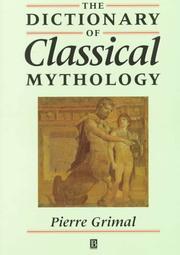
ISBN: 0631132090 0631201025 9780631201021 9780631132097 Year: 1996 Publisher: Oxford : Blackwell,
Abstract | Keywords | Export | Availability | Bookmark
 Loading...
Loading...Choose an application
- Reference Manager
- EndNote
- RefWorks (Direct export to RefWorks)
Mythology, Classical --- -Classical mythology --- -292.1303 --- Dictionaries --- Mythologie --- woordenboeken. --- Mythologie classique. (Encyclopédie) --- Mythologie (Klassieke). (Encyclopedie) --- Mythology, Classical - Dictionaries
Book
ISBN: 9782753508644 275350864X 2753546886 Year: 2009 Volume: *46 Publisher: Rennes: Presses universitaires de Rennes,
Abstract | Keywords | Export | Availability | Bookmark
 Loading...
Loading...Choose an application
- Reference Manager
- EndNote
- RefWorks (Direct export to RefWorks)
Dans une perspective diachronique et pluridisciplinaire, les contributions de ce volume se proposent d'explorer les différentes formes d’appropriation, d’adaptation ou de détournement de la mythologie, qui ont abouti d’un côté à des lectures originales des fables anciennes, de l’autre à un nouveau statut du mythe, voire à des modèles mythologiques différents. Dès l'Antiquité, la mise à distance du mythe a été une source de créativité, renouvelant les formes d’écriture et conduisant à une réorganisation du patrimoine culturel mythologique. En relation avec la polémique soulevée par Platon, les commentateurs néoplatoniciens et les mythographes de l’Antiquité tardive ont engagé un véritable débat sur le bon usage des mythes, sur lequel se sont greffés, au Moyen Âge, des discours supplémentaires, par le biais de la traduction, de la glose et de la réécriture. La réflexion médiévale sur le mythe a entraîné une adaptation de la matière mythologique ancienne, voire un détournement de son sens premier lorsque les récits mythiques païens ont été mis au service des valeurs courtoises et de la Révélation. Le discours moderne sur le mythe s’est enrichi, lui, d’autres instruments (la psychanalyse littéraire, la mythocritique…) et a permis d’avancer des interprétations inédites de l’héritage mythologique, ancien et médiéval, ainsi que de nourrir les discussions sur la nature du mythe.
Myth in literature --- Mythology in literature --- Literature, Ancient --- Literature, Modern --- Mythe dans la littérature --- Mythologie dans la littérature --- Littérature ancienne --- Littérature moderne --- History and criticism --- Histoire et critique --- Mythe dans la littérature --- Mythologie dans la littérature --- Littérature ancienne --- Littérature moderne --- Mythologie classique --- Mythe --- Dans l'art --- Dans la littérature --- Philosophie --- Classics --- Philosophy --- mythologie --- art --- littérature --- philosophie

ISBN: 0415237033 0415237025 9780415237031 0203132459 0203170350 1280327987 113456046X 9786610327980 9780203170359 9780203132456 9780415237024 9781280327988 661032798X 9781134560417 9781134560455 9781134560462 1134560451 Year: 2000 Publisher: London New York Routledge
Abstract | Keywords | Export | Availability | Bookmark
 Loading...
Loading...Choose an application
- Reference Manager
- EndNote
- RefWorks (Direct export to RefWorks)
In this, the first modern study of the ancient fairytale, Graham Anderson asks whether the familiar children's fairytale of today existed in the ancient world. He examines texts from the classical period and finds many stories which resemble those we know today, including:* a Jewish Egyptian Cinderella* a Snow White whose enemy is the goddess Artemis* a Pied Piper at Troy.He puts forward many previously unsuspected candidates as classical variants of the modern fairytale and argues that the degree of violence and cruelty in the ancient tales means they must have been meant for
Mythology, Roman --- Mythology, Greek --- Classical literature --- Fairy tales --- History and criticism --- -Fairy tales --- -Mythology, Greek --- Roman mythology --- Greek mythology --- Fairytales --- Children's stories --- Tales --- Literature, Classical --- Literature --- Literature, Ancient --- Greek literature --- Latin literature --- Mythology, Greek. --- Mythology, Roman. --- History and criticism. --- Classical literature - History and criticism --- Fairy tales - Greece - History and criticism --- Fairy tales - Rome - History and criticism --- MYTHOLOGIE CLASSIQUE --- CONTES DE FEES --- HISTOIRE ET CRITIQUE
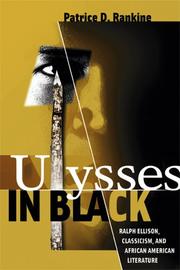
ISBN: 0299220001 9780299220006 0299220044 9786612270321 128227032X 0299220036 9780299220044 9780299220037 6612270322 Year: 2006 Volume: *10 Publisher: Madison, Wis. University of Wisconsin Press
Abstract | Keywords | Export | Availability | Bookmark
 Loading...
Loading...Choose an application
- Reference Manager
- EndNote
- RefWorks (Direct export to RefWorks)
In this groundbreaking work, Patrice D. Rankine asserts that the classics need not be a mark of Eurocentrism, as they have long been considered. Instead, the classical tradition can be part of a self-conscious, prideful approach to African American culture, esthetics, and identity. Ulysses in Black demonstrates that, similar to their white counterparts, African American authors have been students of classical languages, literature, and mythologies by such writers as Homer, Euripides, and Seneca.
Mythologie [Klassieke ] in de literatuur --- Mythologie classique dans la littérature --- Mythology [Classical ] in literature --- Odysseus (Greek mythology) in literature --- Odysseus (Griekse mythologie) in de literatuur --- Ulysse (Mythologie grecque) dans la littérature --- American literature --- Classicism in literature --- Comparative literature --- Mythology, Classical, in literature --- English literature --- Agrarians (Group of writers) --- African American authors&delete& --- Classical influences --- Greek influences --- History and criticism --- Modern and classical --- Ellison, Ralph --- אליסון, ראלף --- Criticism and interpretation. --- African American authors --- Ellison, Ralph Waldo --- Criticism and interpretation --- Literature [Comparative ] --- Odysseus (Greek mythology) in literature. --- Mythology, Classical, in literature. --- Classicism in literature. --- History and criticism. --- Greek influences. --- Classical influences. --- Modern and classical. --- Odysseus, --- In literature. --- Odaiséas, --- Odisej, --- Odiseja, --- Odisėjas, --- Odisejs, --- Odiseo, --- Odiseu, --- Odissea, --- Odisseas, --- Odisseu, --- Odisseus, --- Odissey, --- Odusseus, --- Odüsszeusz, --- Odyseusz, --- Odyssevs, --- Odyseus, --- Odysews, --- Ódysseifur, --- Oliseus, --- Olisseus, --- Oylixeus, --- Olytteus, --- Ulises, --- Ulisse, --- Ulissi, --- Ulixes, --- Ulysse, --- Ulysses, --- Utuze, --- Οδυσσέας, --- Ὀδυσσεύς, --- Ὀλισεύς, --- Ὀλισσεύς, --- Ὀλυττεύς, --- Οὐλιξεύς, --- אודיסאוס, --- オデュッセウス, --- 奥德修斯, --- 오디세우스, --- أوديسيوس, --- Адысей, --- Одисеј, --- Одисей, --- Одіссей, --- Одиссей, --- ELLISON (RALPH), 1914-1994 --- Littérature américaine --- LITTERATURE AMERICAINE --- ULYSSE (MYTHOLOGIE GRECQUE) DANS LA LITTERATURE --- MYTHOLOGIE CLASSIQUE DANS LA LITTERATURE --- CLASSICISME DANS LA LITTERATURE --- LITTERATURE COMPAREE --- CRITIQUE ET INTERPRETATION --- Auteurs noirs américains --- Histoire et critique --- AUTEURS NOIRS --- INFLUENCE GRECQUE --- INFLUENCE CLASSIQUE --- In literature
Book
ISBN: 3161611578 9783161611575 3161611586 9783161611582 Year: 2022 Publisher: Tübingen Mohr Siebeck
Abstract | Keywords | Export | Availability | Bookmark
 Loading...
Loading...Choose an application
- Reference Manager
- EndNote
- RefWorks (Direct export to RefWorks)
"This volume aims to broaden our understanding of the related genres of parables, fables, and similes in the Graeco-Roman world. These genres, which make use of narrative analogy, appear in early Christian and ancient Jewish literatures and in various Graeco-Roman sources. However, despite the fact that these texts were part of the wider cultural context of Graeco-Roman antiquity, they have not yet been thoroughly studied in relation to each other. The present volume brings together contributions on a range of Graeco-Roman, Jewish, and Christian sources, so as to contribute to the study of parables, fables, and similes across disciplinary boundaries. The contributions highlight the fluid boundaries between these different genres, but also demonstrate how their adoption and adaption in different literary works give expression to the distinct identities of the composers."--
Parables --- Parables in rabbinical literature --- Fables --- Simile --- Literary form --- 292 --- 225.08*7 --- 225.08*9 --- 225.08*9 Theologie van het Nieuw Testament: relatie met het hellenisme --- Theologie van het Nieuw Testament: relatie met het hellenisme --- 225.08*7 Theologie van het Nieuwe Testament: relatie met het jodendom --- Theologie van het Nieuwe Testament: relatie met het jodendom --- 292 Godsdiensten van Grieken en Romeinen. Klassieke mythologie --- Godsdiensten van Grieken en Romeinen. Klassieke mythologie --- 292 Religions des Grecs et des Romains. Mythologie classique --- Religions des Grecs et des Romains. Mythologie classique --- 292 Religions of the Greeks and Roman. Classical mythology --- Religions of the Greeks and Roman. Classical mythology --- Didactic literature --- Exempla --- Fiction --- Homiletical illustrations --- Legends --- Literature --- Tales --- Allegories --- Rabbinical literature --- Parabole --- Figures of speech --- History --- Bible --- Ba-yon Tipan --- Bagong Tipan --- Bible. --- Jaji ma Hungi --- Kainē Diathēkē --- New Testament --- Nouveau Testament --- Novo Testamento --- Novum Testamentum --- Novyĭ Zavet --- Novyĭ Zavi︠e︡t Gospoda nashego Īisusa Khrista --- Novyĭ Zavit --- Nuevo Testamento --- Nuovo Testamento --- Nye Testamente --- Perjanjian Baru --- Dhamma sacʻ kyamʻʺ --- Injīl --- Criticism, interpretation, etc. --- Parables. --- Parables in rabbinical literature. --- Fables. --- Simile. --- Rabbinic Judaism --- To 1500
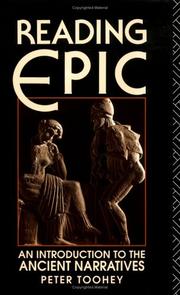
ISBN: 0415042275 0415555078 0203285433 0203169123 113495218X 128006742X 1134952171 9780415042277 9780203169124 9780415042284 0415042283 0415042283 Year: 1992 Publisher: London New York Routledge
Abstract | Keywords | Export | Availability | Bookmark
 Loading...
Loading...Choose an application
- Reference Manager
- EndNote
- RefWorks (Direct export to RefWorks)
Readers new to ancient epic are hampered in two ways: they do not know the ancient languages, and they are unfamiliar with the ancient world. This survey addresses the needs of these readers by offering guidance through the major classical writers of epic: it begins with Homer and concludes with an overview of the development of late ancient epic and of the interface between the epic and the novel.
Ancient history in literature --- Ancient rhetoric --- Antieke retoriek --- Geschiedenis van de oudheid in de literatuur --- Histoire de l'antiquite dans la litterature --- History [Ancient ] in literature --- Mythologie [Klassieke ] in de literatuur --- Mythologie classique dans la littérature --- Mythology [Classical ] in literature --- Narration (Rhetoric) --- Narration (Rhétorique) --- Narrative writing --- Retoriek [Antieke ] --- Retoriek van de Oudheid --- Rhetoric [Ancient ] --- Rhétorique ancienne --- Rhétorique de l'Antiquité --- Verhaal (Retoriek) --- Epic poetry, Classical --- Literature and history --- Mythology, Classical, in literature --- Rhetoric, Ancient --- History, Ancient, in literature --- History and criticism --- Theory, etc --- -Epic poetry, Classical --- -History, Ancient, in literature --- -Literature and history --- -Mythology, Classical, in literature --- Classical languages --- Greek language --- Greek rhetoric --- Latin language --- Latin rhetoric --- Narrative (Rhetoric) --- Rhetoric --- Discourse analysis, Narrative --- Narratees (Rhetoric) --- History and literature --- History and poetry --- Poetry and history --- History --- Classical epic poetry --- Classical poetry --- -Theory, etc --- History and criticism&delete& --- Rhetoric, Ancient. --- Epic poetry [Classical ] --- Theory, etc. --- Greece --- Rome --- History, Ancient, in literature. --- Mythology, Classical, in literature. --- History and criticism. --- Epic poetry, Classical - History and criticism --- Literature and history - Rome --- Epic poetry, Classical - History and criticism - Theory, etc --- Literature and history - Greece
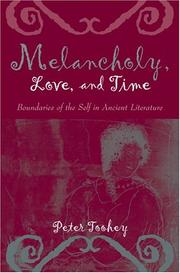
ISBN: 047211302X 9780472025596 0472025597 1282556010 9781282556010 9786612556012 6612556013 9780472113026 Year: 2004 Publisher: Ann Arbor
Abstract | Keywords | Export | Availability | Bookmark
 Loading...
Loading...Choose an application
- Reference Manager
- EndNote
- RefWorks (Direct export to RefWorks)
An examination of the effects and meaning of emotional states of distress in ancient literature.
Alienation (Social psychology) in literature --- Aliénation (Psychologie sociale) dans la littérature --- Aliënatie (Sociale psychologie) in de literatuur --- Aliënatie [Sociale ] in de literatuur --- Amour dans la littérature --- Depressie (Psychiatrie) in de literature --- Depression [Mental ] in literature --- Dépression mentale dans la littérature --- Ik in de literatuur --- Liefde in de literatuur --- Love in literature --- Melancholie in de literatuur --- Melancholy in literature --- Moi dans la littérature --- Mythologie [Klassieke ] in de literatuur --- Mythologie classique dans la littérature --- Mythology [Classical ] in literature --- Mélancolie dans la littérature --- Psychologie als thema in de literatuur --- Psychologie comme thème dans la littérature --- Psychologie dans la littérature --- Psychologie in de literatuur --- Psychology as a theme in literature --- Psychology in literature --- Self in literature --- Sociale aliënatie in de literatuur --- Sociale vervreemding in de literatuur --- Temps dans la littérature --- Tijd in de literatuur --- Time in literature --- Vervreemding [Sociale ] in de literatuur --- Alienation (Social psychology) in literature. --- Classical literature --- Depression, Mental, in literature. --- Love in literature. --- Melancholy in literature. --- Mythology, Classical, in literature. --- Psychology in literature. --- Self in literature. --- Time in literature. --- History and criticism. --- Soi dans la littérature --- Zelf in de literatuur --- Depression, Mental, in literature --- Mythology, Classical, in literature --- History and criticism
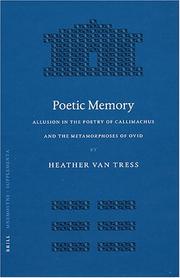
ISBN: 900414157X 9786610867929 9047406621 1280867922 1433706245 9789004141575 Year: 2004 Volume: 258 Publisher: Leiden ; Boston : Brill,
Abstract | Keywords | Export | Availability | Bookmark
 Loading...
Loading...Choose an application
- Reference Manager
- EndNote
- RefWorks (Direct export to RefWorks)
This book explores Callimachus' allusive practice in his Aetia prologue and Hymns 4, 5, and 6, and in Ovid's Metamorphoses . The study includes an overview of modern approaches to poetic allusion, a close (re-)examination of the lexical allusions in the Aetia's and Metamorphoses' prologues, extensive examinations of allusive techniques within selections of these works, the poets' use of 'signposting' and 'authorization' techniques, and the relationship between allusion and genre.
Fables, Latin --- Mythology, Classical, in literature. --- Allusions in literature. --- Rhetoric, Ancient. --- Intertextuality. --- History and criticism. --- Ovid, --- Callimachus --- Knowledge --- Literature. --- Technique. --- Influence. --- Allusies in de literatuur --- Allusions dans la littérature --- Allusions in literature --- Ancient rhetoric --- Antieke retoriek --- Gedaanteverwisseling in de literatuur --- Intertextualiteit --- Intertextuality --- Intertextualité --- Metamorphose dans la litterature --- Metamorphosis in literature --- Mythologie [Klassieke ] in de literatuur --- Mythologie classique dans la littérature --- Mythology [Classical ] in literature --- Retoriek [Antieke ] --- Retoriek van de Oudheid --- Rhetoric [Ancient ] --- Rhétorique ancienne --- Rhétorique de l'Antiquité --- Mythology, Classical, in literature --- Fables latines --- Mythologie ancienne dans la littérature --- Métamorphose dans la littérature --- Allusions dans la littérature --- Intertextualité --- History and criticism --- Histoire et critique --- Literature --- Appreciation --- Technique --- Influence --- Rhetoric, Ancient --- Classical languages --- Greek language --- Greek rhetoric --- Latin language --- Latin rhetoric --- Criticism --- Semiotics --- Influence (Literary, artistic, etc.) --- Rhetoric --- Nasó, P. Ovidi, --- Naso, Publius Ovidius, --- Nazon, --- Ouidio, --- Ovide, --- Ovidi, --- Ovidi Nasó, P., --- Ovidiĭ, --- Ovidiĭ Nazon, Publiĭ, --- Ovidio, --- Ovidio Nasón, P., --- Ovidio Nasone, Publio, --- Ovidios, --- Ovidiu, --- Ovidius Naso, P., --- Ovidius Naso, Publius, --- Owidiusz, --- P. Ovidius Naso, --- Publiĭ Ovidiĭ Nazon, --- Publio Ovidio Nasone, --- Ūvīd, --- אוביד, --- Ovidius Naso, Publius. --- Callimachus Cyrenaeus --- Callimaco --- Callimaque --- Kallimachus --- Kallimachos --- Kallimachos van Kyrene --- Ovid --- Rome --- Fables [Latin ] --- Metamorphosis in literature. --- Kallimakh --- Kālīmākhūs al-Qūrīnī --- Qūrīnī, Kālīmākhūs --- Calímaco --- Kallimach --- Καλλίμαχος --- Ovid, - 43 B.C.-17 or 18 A.D. - Metamorphoses. --- Ovid, - 43 B.C.-17 or 18 A.D.

ISBN: 0521846722 9780521846721 9780511482175 9780521117814 0511482175 9780511128004 0511128002 0511127472 9780511127472 0511300255 9780511300257 1280422343 9781280422348 1107152518 9781107152519 0511182279 9780511182273 0511199694 9780511199691 052111781X Year: 2005 Publisher: Cambridge, U.K. New York Cambridge University Press
Abstract | Keywords | Export | Availability | Bookmark
 Loading...
Loading...Choose an application
- Reference Manager
- EndNote
- RefWorks (Direct export to RefWorks)
Ovid's Heroides, a catalogue of letters by women who have been deserted, has too frequently been examined as merely a lament. In a new departure, this book portrays the women of the Heroides as a community of authors. Combining close readings of the texts and their mythological backgrounds with critical methods, the book argues that the points of similarity between the different letters of the Heroides, so often derided by modern critics, represent a brilliant exploitation of intratextuality, in which the Ovidian heroine self-consciously fashions herself as an alluding author influenced by what she has read within the Heroides. Far from being naive and impotent victims, therefore, the heroines are remarkably astute, if not always successful, at adapting textual strategies that they perceive as useful for attaining their own ends. With this new approach Professor Fulkerson shows that the Heroides articulate a fictional poetic, mirroring contemporary practices of poetic composition.
Epistolary poetry, Latin --- Women in literature --- History and criticism --- Ovid, --- Authorship in literature. --- Books and reading in literature. --- Heroines in literature. --- Intertextuality. --- Love-letters in literature. --- Mythology, Classical, in literature. --- Women authors in literature. --- Women in literature. --- History and criticism. --- Technique. --- Authorship in literature --- Books and reading in literature --- Heroines in literature --- Intertextuality --- Love-letters in literature --- Mythology, Classical, in literature --- Women authors in literature --- Woman (Christian theology) in literature --- Women in drama --- Women in poetry --- Criticism --- Semiotics --- Influence (Literary, artistic, etc.) --- Heroines --- Nasó, P. Ovidi, --- Naso, Publius Ovidius, --- Nazon, --- Ouidio, --- Ovide, --- Ovidi, --- Ovidi Nasó, P., --- Ovidiĭ, --- Ovidiĭ Nazon, Publiĭ, --- Ovidio, --- Ovidio Nasón, P., --- Ovidio Nasone, Publio, --- Ovidios, --- Ovidiu, --- Ovidius Naso, P., --- Ovidius Naso, Publius, --- Owidiusz, --- P. Ovidius Naso, --- Publiĭ Ovidiĭ Nazon, --- Publio Ovidio Nasone, --- Ūvīd, --- אוביד, --- Ovid --- Arts and Humanities --- History --- Epistolary poetry, Latin - History and criticism --- Ovid, - 43 B.C.-17 or 18 A.D. - Heroides --- Ovide (0043 av. J.-C.-0017). Héroïdes --- Poésie élégiaque latine --- Ovide (0043 av. J.-C.-0017) --- Mythologie classique --- Femmes --- Héroïnes (littérature) --- Personnages --- Dans la littérature
| Listing 1 - 10 of 10 |
Sort by
|

 Search
Search Feedback
Feedback About UniCat
About UniCat  Help
Help News
News